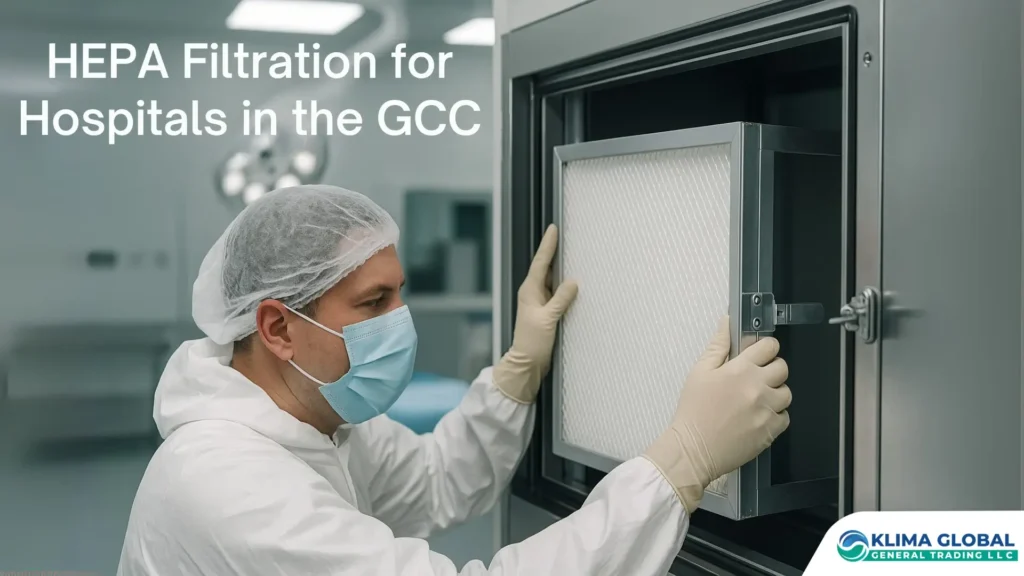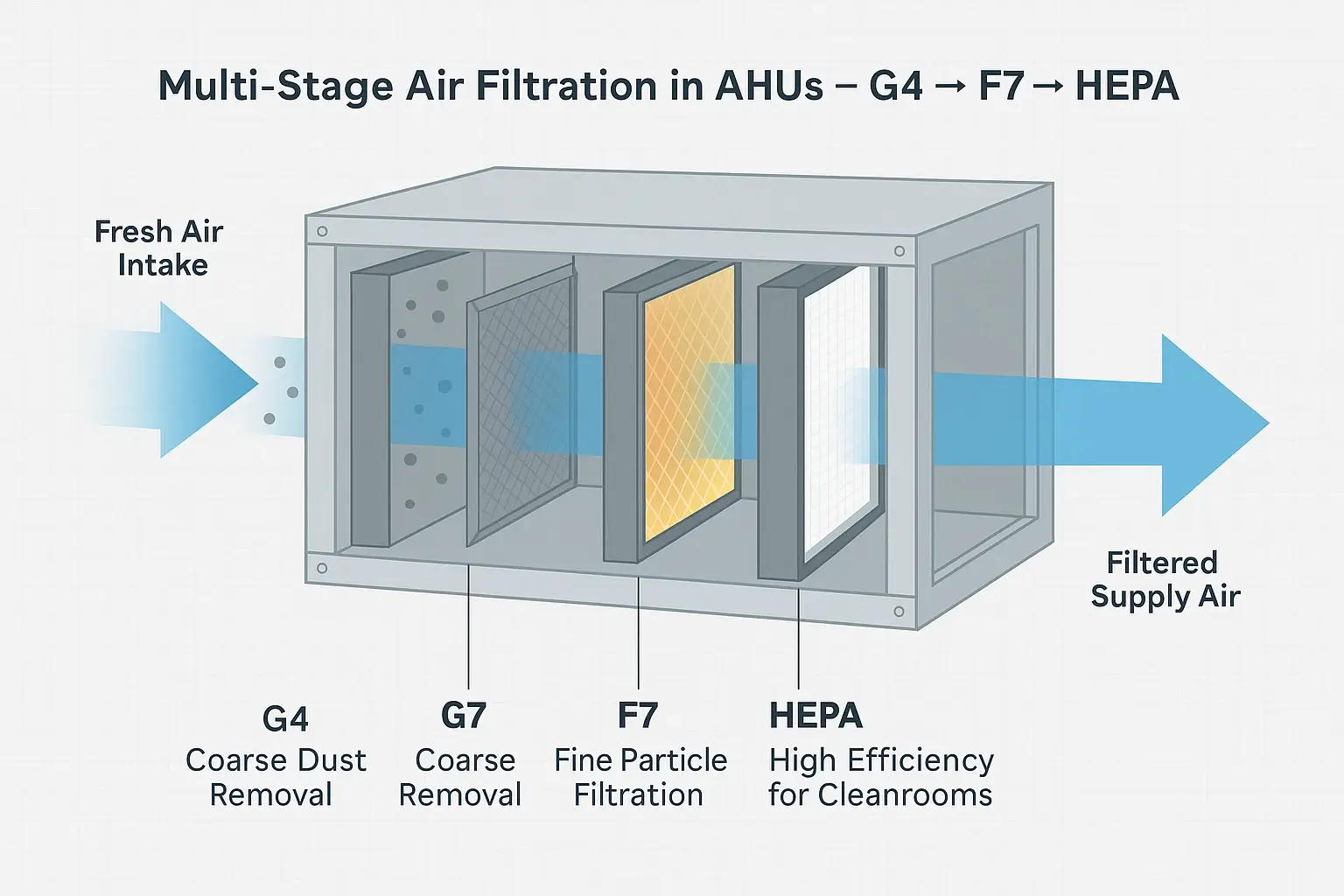

HEPA Filters in Healthcare HVAC: Selection, Placement, and Maintenance
Maintaining clean and sterile indoor air is non-negotiable in healthcare environments. Hospitals, clinics, and laboratories across the GCC—especially in the UAE, Saudi Arabia, and Qatar—are increasingly prioritizing indoor air quality (IAQ) due to the heightened focus on infection control. From operating rooms to intensive care units, the risk of airborne pathogens is significant. That’s why HEPA filters in hospitals have become the gold standard for particulate air filtration.
In recent years, post-pandemic trends, urban air pollution, and advancements in IAQ regulation have further accelerated the adoption of HEPA-grade filtration in the healthcare sector. Facility managers and HVAC professionals are now tasked with choosing the right filter types and configurations to meet stringent hospital hygiene codes while maintaining operational efficiency. In this article, we’ll explore how HEPA filters in hospitals enhance air quality, where they are best placed in healthcare HVAC systems, and how proper maintenance ensures long-term safety and compliance across GCC nations.
Explore how Hygienic AHUs for Hospitals enhance air quality and work seamlessly with HEPA filtration systems for GCC healthcare facilities.
What Are HEPA Filters and Why Are They Used in Hospitals?
HEPA (High-Efficiency Particulate Air) filters are engineered to remove 99.97% of airborne particles as small as 0.3 microns. This includes common pathogens such as bacteria, viruses, fungal spores, and a wide range of other particulate contaminants.
HEPA filters in hospitals are used as a crucial line of defense in critical environments such as:
Operating Theatres
Isolation Rooms (including negative pressure rooms)
ICUs & NICUs
Organ transplant rooms
Central sterile service departments (CSSDs)
Clinical Laboratories
The ability of HEPA filters to minimize airborne transmission of infectious diseases like tuberculosis, influenza, or even COVID-19 makes them a foundational component of modern hospital ventilation systems. Their consistent performance and availability also make them a preferred choice over ULPA filters, which—while offering slightly better filtration—are often costlier and introduce higher pressure drops.
HEPA Filter Grades and Standards for Healthcare HVAC
HEPA filters in hospitals are categorized under the EN1822 standard and are commonly specified in two main grades for healthcare applications:
H13: ≥99.95% efficiency at capturing particles
H14: ≥99.995% efficiency for ultra-critical applications
These grades are selected based on the required cleanliness levels of specific hospital zones:
ISO Class 5–7 clean zones (e.g., surgical suites, isolation rooms): H14 filters
ISO Class 8 or administrative areas: H13 filters suffice
Standards influencing filter selection include:
EN1822:2009 for HEPA/ULPA testing
ISO 29463 (updated HEPA classification method)
ASHRAE Standard 170-2021 for ventilation in healthcare facilities
ISO 14644-1 for cleanroom classification
Klima Global recommends ACS/CLIMACS AHUs pre-configured with certified H13/H14 filter slots to ensure safe, hygienic airflow distribution throughout critical hospital spaces in GCC settings.
Ideal Placement of HEPA Filters in Hospital Air Handling Units

To ensure the maximum effectiveness of HEPA filters in hospitals, careful placement and system design is crucial:
Terminal HEPA filters: Installed at the room-level supply (in diffusers or ceiling-mounted boxes) to eliminate contamination from ducts.
AHU-integrated HEPA filtration: Ensures centralized filtration in zones where duct hygiene is assured and maintenance access is feasible.
Pre-filtration strategy: Using G4 (coarse) and F7 (fine) filters upstream of HEPA stages prevents clogging and extends HEPA lifespan.
Exhaust filtration: In rooms like airborne isolation areas, HEPA filters are used on exhaust ducts to prevent contaminated air from recirculating.
Seal type: Gasket vs gel-seal options depending on leakage tolerance and replacement frequency.
ACS/CLIMACS AHUs support both inline and terminal HEPA configurations. Klima Global’s HEPA filter boxes allow modular deployment where direct AHU integration is impractical or requires retrofitting.
Maintenance Best Practices for HEPA Filters in Hospitals
Efficient maintenance of HEPA filters in hospitals not only preserves air quality but is also crucial for maintaining healthcare accreditation, patient outcomes, and HVAC system performance.
Key practices include:
Scheduled filter inspections (quarterly or as needed)
Differential pressure monitoring to assess clogging and airflow resistance
Aerosol integrity testing (DOP/PAO tests) for leak verification, typically once per year
Replacement planning: Generally every 6–12 months or earlier if performance thresholds are breached
Safe removal and disposal: Following biohazard protocols using PPE and sealed bags
Documenting filter condition, replacement dates, and test results is essential for compliance with UAE’s SEHA, Saudi Arabia’s Ministry of Health, and international audit standards.
For a reliable preventive maintenance framework, Klima Global offers downloadable guides like the AHU Maintenance Checklist for UAE, which can be customized to individual healthcare facilities.
GCC-Specific Healthcare Requirements for Filtration
Hospitals in the GCC operate in unique climatic and regulatory contexts that significantly impact air handling unit design and filtration protocols.
UAE: DHA, SEHA, and MOH enforce compliance with ASHRAE and ISO IAQ standards for surgical and isolation rooms.
Saudi Arabia: HVAC systems in healthcare must align with GACA and Ministry of Health hygiene protocols and air change rates.
Qatar, Oman, Bahrain, Kuwait: MOH and public works guidelines increasingly require multi-stage filtration with HEPA endpoints.
In addition to regulatory mandates:
High dust loads from desert environments cause faster filter saturation.
Humidity fluctuations affect biological growth on filters if not controlled.
Variable building pressurization due to energy optimization requires fine-tuned air balancing around HEPA barriers.
These factors make HEPA filters in hospitals more than just a best practice—they are essential for safe, compliant operations.
Discover our Healthcare HVAC Solutions designed to meet GCC regulatory standards and optimize hospital air filtration.
How ACS CLIMACS AHUs Support HEPA Integration
ACS CLIMACS air handling units from Klima Global are engineered for seamless HEPA filtration integration in healthcare environments across the GCC. Their features include:
Dedicated HEPA-compatible filter sections with side-access doors for replacement
Double-skin construction (50mm PU insulation) with anti-microbial coatings
Low-leakage access panels with gasket compression to maintain filter integrity
Built-in UV-C options for secondary sterilization
Integrated differential pressure sensors and filter monitoring modules
Custom options include:
Positive and negative pressure room AHUs
Roof-mounted compact units for modular hospitals
AHUs with integrated humidifiers and recovery systems for ICUs and operating theatres
These configurations allow healthcare facilities to implement HEPA filters in hospitals without compromise.
Learn more about our comprehensive Air Handling Units engineered to support HEPA filter integration in critical medical environments.
Summary: Choosing the Right HEPA Strategy for Your Healthcare Project
When selecting the optimal HEPA filtration approach for your facility, consider the following:
Space usage: ICU, OT, general ward, or admin
Required room classification under ISO or local codes
Pressure management: Negative vs positive pressurization
Pre-filtration support and serviceability
Operational cost: Lower pressure drop = lower fan energy
Engaging with an experienced supplier like Klima Global ensures correct product selection, professional integration, and ongoing support for HEPA filters in hospitals across diverse GCC conditions.
Frequently Asked Questions (FAQ)
What is the minimum HEPA grade required for hospital ICUs?
H14 filters are typically required to maintain ISO Class 5–6 air in high-dependency units.
How often should HEPA filters be replaced in hospitals?
Every 6 to 12 months, depending on contamination level, filter loading, and test results.
Where should HEPA filters be placed in AHUs?
Ideally near the point-of-use (terminal supply), but also inside AHUs when accessibility and duct hygiene are maintained.
Can HEPA filters remove viruses like SARS-CoV-2?
Yes, HEPA filters remove viral particles through mechanisms like interception, impaction, and diffusion.
What is the pressure drop across a HEPA filter?
Generally ranges between 250–450 Pa at rated airflow. Actual values depend on grade and installation type.
Need help selecting the right HEPA filtration for your hospital?
Klima Global offers HEPA-ready AHUs, filter boxes, and certified support across the GCC.
Get Expert Advice NowShare this post
Related Posts
Latest Posts

Ecology Unit Supplier in Saudi Arabia and UAE





HEPA vs. ULPA Filters: Which One Should You Choose?
